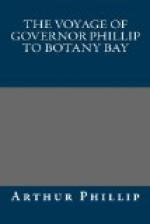he immediately brought to, with the ship’s head
off from the land, and gave a signal for the Friendship
to do the same. They lay to all night, and the
next morning were surprised with the sight of a most
mountainous coast, bearing from north-east by east
to west-north-west, about five or six leagues distant.
This proved sufficiently that the land seen the preceding
day could not be Egmont Island, and Lieutenant Shortland
was inclined to think that this was united to it.
At six in the morning he bore away west by north,
and west by north half north, as the land trended,
running along the shore at five or six leagues distance.
The most eastern point of this land he called Cape
Henslow, the most western which was then in sight,
Cape Hunter. Between these two points the land
is very singularly mountainous, the summits of the
mountains rising among the clouds to a prodigious
height. It may be known by one summit more elevated
than the rest, which, from being discovered on the
first of August, was named Mount Lammas, and is thought
in height to equal, if not to exceed the Peak of Teneriffe.
This day the latitude was by observation 9 deg.. 58’.
south, and the longitude 160 deg.. 21’. east.
More land still continued to open to the west-north-west,
and the same course was therefore kept at an equal
distance from the shore till three in the afternoon,
when the water appearing suddenly of a different colour,
they brought to, and sounded, but found no ground
at 120 fathoms. At four, a part of the land which
had the appearance of a harbour, bore north-north-east
distant seven leagues. The land still continued
mountainous, and at six o’clock bore from north-east
to north-west by west. The furthest land then
in sight appeared to be at the distance of about thirteen
or fourteen leagues, and was named Cape Marsh.
At half past six the ships were brought to, and lay
to for the night, the weather being very squally, with
violent thunder, lightning, and rain.
2 August 1788
Soon after five in the morning of August the 2d, the ships made sail again, and bore away west by north, but the weather being hazy, no land was then in sight; many flying fish were seen at this time. At eleven, there being a prospect of clearer weather, Lieutenant Shortland endeavoured to make the land again. At noon the latitude was, by observation, 9 deg.. 40’. south, and the longitude 158 deg.. 42’. east. Lieutenant Shortland continued to steer north-west to discover whether he had reached the utmost extent of the land, and at eight in the evening spoke to the Friendship, and told the master that he intended to bring to at nine.
3 August 1788




